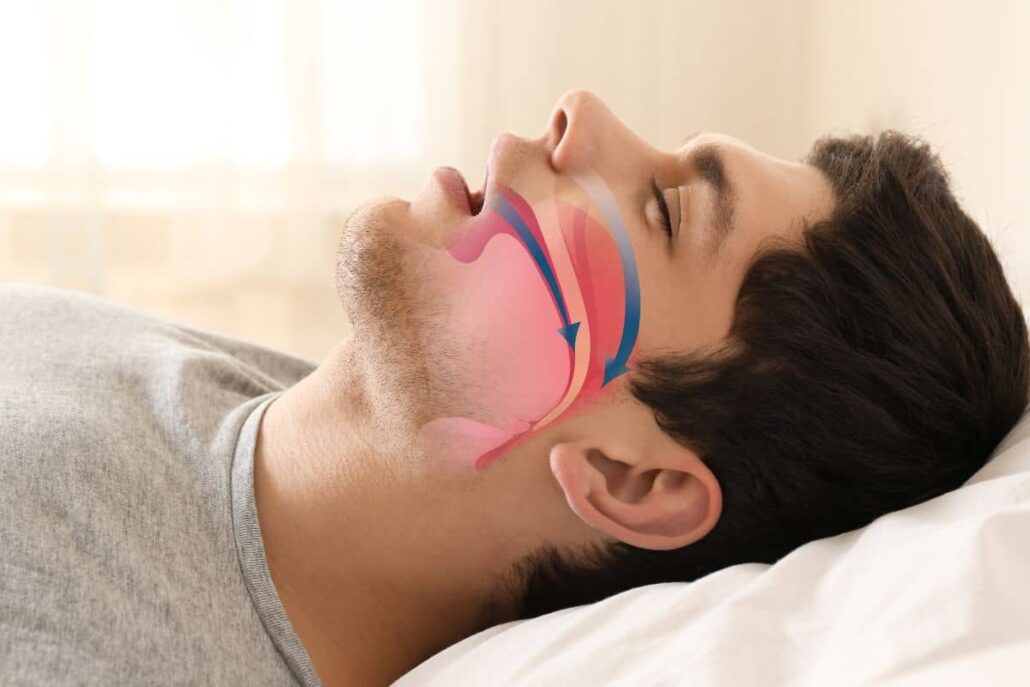Sleep apnea is a prevalent sleep disorder characterized by repeated interruptions in breathing during sleep, leading to fragmented rest and diminished oxygen supply to vital organs. These disruptions can result in a range of symptoms, notably loud snoring, daytime fatigue, and morning headaches. Throat-related manifestations, such as a dry mouth or sore throat upon waking, are also common and can serve as important indicators of the condition. Penn Medicine Becker ENT & Allergy in New Jersey and Philadelphia provides expert care for sleep apnea patients by offering thorough evaluations and custom care plans to improve sleep quality.s.

Effective Care and Solutions for Sleep Apnea
- Sleep apnea causes breathing interruptions during sleep, with throat symptoms like loud snoring and dry mouth.
- Untreated sleep apnea can shorten life expectancy and increase the risk of death by 17%.
- Treatment options include CPAP therapy, surgical interventions, and lifestyle modifications.
- Timely treatment improves sleep quality, reduces cardiovascular risks, and enhances overall health.
- Penn Medicine Becker ENT & Allergy offers comprehensive sleep apnea care in New Jersey and Philadelphia.
Link Between Throat Symptoms and Sleep Apnea
Sleep apnea is a prevalent sleep disorder that disrupts normal breathing patterns during sleep, often showing throat-related symptoms.
In New Jersey and Philadelphia, Penn Medicine Becker ENT & Allergy offers a comprehensive approach to diagnosing and treating sleep apnea.
Recognizing Throat Symptoms of Sleep Apnea to Watch For
Recognizing throat symptoms associated with sleep apnea is essential for timely medical attention. Here are some key throat symptoms associated with sleep apnea:
- Morning Sore Throat: People with sleep apnea often wake up with a sore throat due to breathing issues and a dry mouth.
- Dry Mouth: Frequent in sleep apnea patients due to reduced saliva flow from open-mouth breathing.
- Persistent Hoarseness: Caused by the strain on the vocal cords from interrupted airflow.
- Frequent Throat Clearing: A result of nasal congestion and airway dryness.
Understanding these symptoms is the first step toward effective treatment.
Early detection and expert care can avert potential complications of untreated sleep apnea, such as cardiovascular problems and diminished life expectancy.
If you or a loved one are experiencing these throat-related symptoms, consider scheduling a consultation with Penn Medicine Becker ENT & Allergy.
Professional Treatment for Sleep Apnea
Early diagnosis and treatment of sleep apnea are crucial to prevent serious health complications.
Untreated obstructive sleep apnea (OSA) can lead to high blood pressure, heart disease, stroke, and diabetes. Common signs include loud snoring, daytime sleepiness, and morning headaches.
Risk factors encompass obesity, a narrow throat, and enlarged tonsils or adenoids.
A sleep study can confirm the diagnosis, and treatments can effectively manage the condition.
Consulting with an expert ensures personalized care, improving sleep quality and overall health.
Treatment Options

Penn Medicine Becker ENT & Allergy offers comprehensive sleep apnea treatments, including:
- CPAP Therapy: Continuous airflow to maintain open airways during sleep.
- Oral Appliances: Custom-fitted devices repositioning the jaw and tongue to prevent airway obstruction.
- Surgical Options: Procedures like palate stiffening, tongue base reduction, and tonsil removal to address anatomical causes.
- Lifestyle Modifications: Weight management, avoiding alcohol and sedatives, positional therapy, and managing nasal congestion to improve symptoms.
Ready to find lasting relief?
Contact Becker ENT & Allergy today to schedule your consultation in New Jersey or Philadelphia.
Benefits of Treating Sleep Apnea on Time
Timely treatment for sleep apnea offers numerous health benefits that improve overall well-being and quality of life, including:
- Enhanced Heart Health: Early intervention for obstructive sleep apnea syndrome (OSA) plays a vital role in reducing risks associated with heart health, such as high blood pressure and heart conditions like heart attacks and heart failure. Addressing central and obstructive sleep apnea with a continuous positive airway pressure (CPAP) machine can greatly minimize these risks, especially for adults with mild to severe blockage in their upper throat.
- Improved Sleep Quality: With treatment, individuals experience a smoother sleep cycle, free from disruptive breathing starts and silent periods where airflow temporarily ceases. This leads to better quality sleep, reducing loud snorts, lack of sleep, and daytime fatigue. Effective treatment encourages uninterrupted rest, leaving you refreshed and alert.
- Reduced Risk of Depression and Anxiety: The lack of sleep associated with untreated sleep apnea often affects mental health, increasing the likelihood of depression and anxiety. Regular use of positive airway pressure machines or other therapies promotes consistent sleep, easing these mental health issues.
- Lower Blood Pressure: By opening the airway—whether it’s due to a clear upper throat or reduced soft palate obstruction—treatment alleviates pressure on the heart, leading to reduced blood pressure and lower strain on other vital organs. This also decreases the possible complications of chronic medical conditions related to blood pressure.
- Improved Breathing: A clear airway reduces breathing pauses, so the lungs receive enough oxygen, which also decreases risks associated with blood oxygen fluctuations.
- Prevention of Long-term Complications: Signs of sleep apnea, such as loud snoring or gasping for air, can be managed before they escalate into severe complications. Visiting an expert help you manage symptoms like large tonsils or a blocked windpipe early on.
Timely treatment can greatly improve daily functioning, mental clarity, and long-term health.
What Happens if Sleep Apnea is Left Untreated?
Leaving sleep apnea untreated can lead to serious health complications due to frequent breathing stops that impact vital organs and the brain, such as:
- Increased Risk of Heart Disease: Untreated obstructive sleep apnea, including throat and central sleep apnea, places a significant strain on the cardiovascular system, increasing the likelihood of heart disease, heart failure, and abnormal heart rhythms.
- High Blood Pressure: When breathing stops regularly due to obstructive or central sleep apnea, blood pressure naturally spikes, which increases the risk of hypertension and related heart conditions. Mild sleep apnea, if left untreated, can still elevate blood pressure over time, silently contributing to a higher risk of cardiovascular problems.
- Mental Health Challenges: Chronic sleep problems can lead to mental health issues such as depression, anxiety, and even insomnia.
- Reduced Oxygen to the Body: A blocked airway reduces oxygen levels, straining the heart, lungs, and other organs.
- Daytime Sleepiness and Accidents: Poor sleep quality causes extreme daytime sleepiness, which can lead to accidents, especially while driving or operating machinery.
By addressing sleep apnea with a sleep partner’s support, healthy bedtime habits, and appropriate medical guidance, individuals can enjoy better mental clarity, optimal daily functioning, and improved long-term health outcomes.

Take control of your health now!
Addressing sleep apnea early can protect you from long-term complications. Schedule an appointment with our specialists.
How Penn Medicine Becker ENT & Allergy Can Help with Sleep Apnea Treatment
Penn Medicine Becker ENT & Allergy offers comprehensive, personalized sleep apnea care at multiple locations.
From CPAP therapy to advanced surgical solutions, our team tailors treatment plans to address individual needs and severity levels.
With expert ENT physicians and state-of-the-art technology, we provide effective solutions to improve breathing, sleep quality, and overall health, helping patients regain vitality and well-being.
Consult with ENT Expert Doctors
Consult the ENT experts at Penn Medicine Becker ENT & Allergy to assess your sleep apnea symptoms by setting up an appointment.
Our skilled doctors provide customized treatment plans, helping you manage symptoms, prevent complications, and improve sleep quality for a healthier life.

